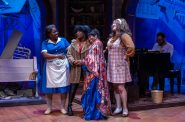My friend, my journey with comedian Lewis Black
Act 1: In the beginning
Long, long ago in a galaxy far, far away, I spent a lot of time in a bar, in a basement. The bar was the West Bank Café and the galaxy was New York City. The long ago part? That was the 1980s when everything, at least in New York City, was still pretty loosey goosey, though near the end things were beginning to tighten up a bit.
The owner of the West Bank, Steve Olsen, had the wisdom, courage and sense of fun to turn the basement over to three guys who had worked together at the Yale School of Drama. For most of those ten years or so, the basement at the West Bank Café, just west of Ninth Avenue on 42nd Street, was a playhouse for those three and anyone who wandered by, had talent and didn’t mind working in a bar. Rand Foerster was the director and probably did most of the heavy lifting (i.e. the scheduling and making sure the performers were happy). Rusty Magee was the music director and, in many ways, the heart of the whole operation. Lewis Black was the resident playwright, maybe the brains and definitely the mouth of what were the most vital, virile, fun and fundamentally risky theater experiences of my life, so far.
Every night there was something going on: one-act plays, two of them every night; music on the weekends; a midnight comedy show on Saturdays; and The Free Show, which was impossible to get a seat for unless you started drinking there at six or seven in the evening. That show would go on until three or four in the morning. It was open mike and almost anybody could stand up if they were respectful of Rand, Rusty, Lewis and Steve. And, it was always anything goes.
Once I saw Lewis go up on stage, take a comedian named Sam Diego gently by the elbow, turn him around and walk him to the back. He then turned him toward the back wall, during which time Sam continued to do his act, which he had threatened never to bring to a close. Lewis then came back downstage and whispered to the 30 or 40 people who were still conscious that we should just quietly leave now, or we might never get out alive. Sam went on talking to the wall; that was about five in the morning. Most of us hadn’t stopped laughing since the show began and hadn’t stopped drinking since six or seven when we first wandered down there to see the one-acts that started the evening.
Back then, Lewis thought of himself as a playwright, but he introduced every play with a few minutes of commentary. It was commentary more than comedy, but it was funny because Lew was so passionate about it. He would get into a genuine rant over something, and you had to laugh because it was almost impossible to be as angry as he was and still sit down and enjoy your drink. He saw things from a perspective that was all his own. That’s what makes really good comedians: an absolutely unique view of the world; the willingness to own that view; and the ability to articulate it and to care about it — really care about it, at the same time.
We had a lot of conversations about whether he should concentrate on playwriting or turn to stand-up comedy. Playwriting is more private, and the failure is quieter. Stand-up is a grind, and you fail very publicly. You die in the parlance, or you kill.
Stand-up comedians were just beginning to be treated like rock stars in those days. Saturday Night Live made funny people popular. Ronald Reagan and the first George Bush were the presidents, so you had to be funny to survive; kind of the way the doctors in a M.A.S.H. unit make jokes to withstand the horror. Ultimately, you go with what works and comedy was working for Lewis. John Bowman had been playing clubs throughout his native Michigan, when he wasn’t in the basement with us, and he convinced Lewis to go on the road with him and try it out. That was the beginning …
Act 2: In his element
By the mid ’90s, he was doing gigs on the road. I’d see him in Vegas or on a college campus, if I happened to be fishing or wandering around the neighborhood. It was amazing to see some of the same routines that had blown people away in the basement on 42nd Street, slightly reworked for a Vegas audience that was part blue rinse, part leisure suits, part hustlers and all a little distracted by the money next door. And, Lewis was doing it. He’d made the transition. No, that’s wrong. He had translated the angst and anger into a comedic language that worked in a lot of different places.
Lewis was always political, that was what was great about him. But in Vegas, he could do ten minutes on the weather with the same intensity and wit that he put into ten minutes on George H.W. Bush. It was a revelation to me. It’s always a bit of a revelation when you can suddenly see the dancer and the dance, as W.B. Yeats puts it. I love it and am strangely saddened when suddenly what seemed to be a force of nature is revealed as the product of design.
He learned his chops during the Clinton years and that great disappointment. George W. Bush brought him to a place of such outrage that a mental breakdown or a stroke was always a possibility. We use our comedians and commentators, somewhat the way the Romans used the Christians and the gladiators. Lewis could have a breakdown on stage and become so outraged that every molecule of his body would shake, with spittle coming out of his mouth and with his eyes red and almost bleeding; he expressed our anger for us.
 Now, he’s 61 years old, travels the country in a big bus (still with John Bowman), has authored a book (Me of Little Faith) and is back writing plays again. He’s hammered at the door of Hollywood and a series for so long that I think he’s decided to pass on that one. His edge, the thing that makes him unique and special, is too raw, angry, bitter and violently disappointed for television, although his specials on HBO are very popular. He’s regularly on The Daily Show with Jon Stewart. He’s been asked to perform before Dick Cheney, of all people, by the Press Club of Washington, D.C., and for the last two years he traveled to Iraq and Afghanistan during Christmastime for the USO.
Now, he’s 61 years old, travels the country in a big bus (still with John Bowman), has authored a book (Me of Little Faith) and is back writing plays again. He’s hammered at the door of Hollywood and a series for so long that I think he’s decided to pass on that one. His edge, the thing that makes him unique and special, is too raw, angry, bitter and violently disappointed for television, although his specials on HBO are very popular. He’s regularly on The Daily Show with Jon Stewart. He’s been asked to perform before Dick Cheney, of all people, by the Press Club of Washington, D.C., and for the last two years he traveled to Iraq and Afghanistan during Christmastime for the USO.
Act 3: In Milwaukee
I spoke to Lewis before and after his show this past Saturday at the Riverside Theater, and I think he is genuinely bewildered by the fact that his anger, his outrage and his politics have made him a wealthy man and that someone as bitter as he is can be so popular with so many.
Bowman was brilliant on Saturday night, too, by the way. And Lewis brought it all and left it on the stage.
Nothing will ever get him to relax. He is deeply funny and profoundly upset and that makes me sleep a lot easier.
Theater
-
‘The Treasurer’ a Darkly Funny Family Play
 Apr 29th, 2024 by Dominique Paul Noth
Apr 29th, 2024 by Dominique Paul Noth
-
Rep’s Nina Simone Play a Puzzle
 Apr 23rd, 2024 by Dominique Paul Noth
Apr 23rd, 2024 by Dominique Paul Noth
-
Skylight’s ‘Eternity’ Is a Slam Bang Show
 Apr 15th, 2024 by Dominique Paul Noth
Apr 15th, 2024 by Dominique Paul Noth























Thanks for this story, Mark. Great stuff. — Strini